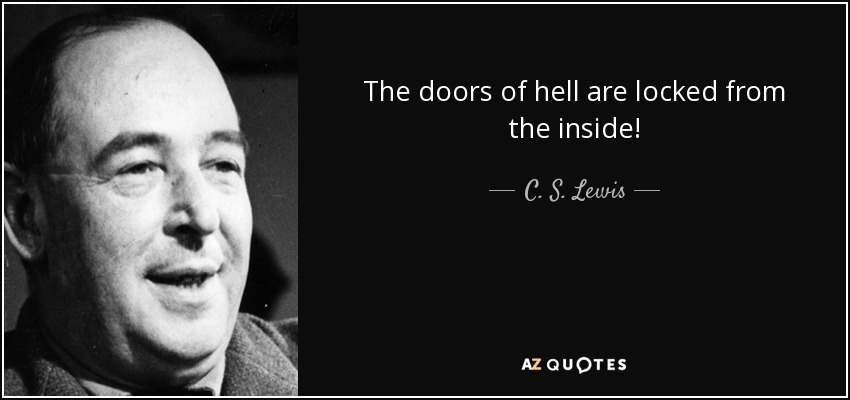Hell as Separation
In recent years, the doctrine of eternal conscious torment (ECT) has tumbled out of favor by many within modern evangelicalism. Sure, there are still quite a number that hold to the traditional view of hell. However, in the previous four centuries, a relatively newer doctrine of hell has appeared that still maintains the eternity of punishment aspect of ECT but denies the literal flames and fire of perdition. This view is commonly known as the “separation view,” or sometimes “the metaphorical view,” or what many simply call “hell as separation.”
Most would recognize this view when a Christian says something comparable to, “Hell isn’t literal torment, hell is separation from God.” The word “separation” is fundamental to understanding this view of hell because it emphasizes an eternity of existence without God. Those that adhere to this view can still claim that they maintain an “inerrant” reading of Scripture while denying the seemingly cruel nature of God that ostensibly allows people to be tortured for eternity. It alleviates God as a “moral monster” and portrays Him as someone who instead lets individuals consign their own fate “away from the presence of God” due to their unbelief in Him.

Scriptural Support
The Scriptural verse that most who hold this viewpoint use in defense of their interpretation is 2 Thess. 1:9, which states about those who do not obey the Gospel, “They will suffer the punishment of eternal destruction, away from the presence of the Lord and from the glory of his might” (ESV). According to some who hold this view, the Bible is clear when it mentions the reality of hell, and it is awful—but the fire and flames with which it is described are only symbolic and not to be taken literally. This idea generally stems from the enlightenment age (16th-17th century) when philosophers and religious thinkers began to take a closer look at this doctrine and see if the literal understanding of it is correct or if there is more occurring within Scripture that might be genre-specific or metaphorical to simply accentuate a point.
Many would likewise point to such parables as the Wedding Feast in Matt 22. In this parable Jesus is specifically speaking towards the Pharisees and suggests that they will be left on the outside of the celebration banquet with the King. Matt 22:13 states, “Then the king said to the attendants, ‘Bind him hand and foot, and throw him into the outer darkness, where there will be weeping and gnashing of teeth.'” The suggestion here is that the Pharisees are outside of the kingdom, but not in torment, just sorrow.
Another popular passage that indicates hell as separation comes from Matt 24:40, which records Jesus saying, “Then there shall be two men in the field; one will be taken, and one will be left. Two women will be grinding at the mill; one will be taken, and one will be left. Therefore be on the alert, for you do not know which day your Lord is coming.” Again, it does not suggest eternal torment or fire but the punishment will be somewhere where God is not.
Enlightenment Questions
For example, enlightenment author Samuel Richardson, writing in 1660 in his A Discourse of the Torments of Hell, argued that the notion of physical fire is incoherent since hell is depicted throughout the Bible using such modifiers as “darkness,” “blackness,” and “the abyss.” Therefore, a literal fire would render those places illuminated and, consequently, not dark. So there is an apparent contradiction if the literal view of hell is indeed correct because “fire” and “darkness” are often juxtaposed in Jewish writings including, the Dead Sea Scrolls and some of the Apocryphal writings. Therefore, according to Richardson, a non-literal view must be in order.
Moreover, Richardson postulated, much like Augustine did also, that literal fire could not work on spirits since they do not have physical nerve endings and could not “feel” in the sense that modern humans do today. Could God cause literal fire to torture the spirit world? Sure. However, just because something is possible does not make it probable. Similarly, many in that time wondered if those in heaven would not be distraught and dismayed by the thoughts of their loved ones being burned eternally somewhere in the cosmos. The idea of unadulterated pleasure in heaven while family members are being roasted for eternity hit a nerve with philosophers during this time (and some before this time as well) so much that it forced people to think more in metaphorical expressions than a stringent, literal analysis of some Scriptures that contained fire terminology.

The Reformers
Even the reformer John Calvin writes, “We may conclude from many passages of Scripture, that it (eternal fire) is a metaphorical expression.” Similarly, the famous Princeton Scholar Charles Hodge even writes, “There seems no more reason for supposing that the fire spoke of in Scripture is to be a literal fire, than that the worm that never dies is literally a worm.” Many in this era realized the doctrine of heaven and hell not as literal examples of concrete reality but something that pointed still to an actual but indefinable state. It should be noted, however, that just because they view the fire and flames as metaphorical, they do still take the reality of hell seriously.
Colorful Language
Many times, in ancient rabbinic Judaism, the rabbis (which includes Jesus) used very colorful and expressive language to emote a sensation from their hearers. Jesus spoke in parables, riddles, and many other communicative word-pictures, including hyperbole. Hell is not literal fire and flames as much as “you must hate your father and mother” if you want to follow Jesus is a literal hatred towards one’s parents. Reasoning of this type has led to the hell as separation view’s increasing popularity.
As put forth by many who hold this method of interpretation, the problem is with our contemporary understanding of concrete realities. We, in the 21st century, like black and white; up and down; left and right; and good or bad. We do not do well with figures of speech that intend to draw out an emotion to establish a point or teach a moral lesson. Moreover, Jesus and his first-century contemporaries were speaking to a majority illiterate audience who could not read, and therefore, relied heavily on imagery and symbolism to demonstrate a position the speaker wanted to propose. Apocalyptic literature, for example, grew out of an illiterate society because of its ability to synthesize concrete reality with abstract images that did not require literacy.
Hell as Regret
This is a branch of the separation view that sees hell as more phycological than any manner of physical torment. For example, William Crockett, in his essay in Four Views on Hell writes, “Whatever their punishment, wherever they are sent, the final judgment cannot be anything but laden with sorrow.” Hell, in this case, is more of a phycological regret of missing out on something. The Biblical phrase “weeping and gnashing of teeth” appears to support this by displaying signs of deep remorse of being left on the outside and away from God’s presence.
Popular YouTube apologist Michael Jones (aka “Inspiring Philosophy”) created a video where he gives a 36-minute interview on why hell is a phycological state and not a literal place where people are in torment (found HERE). I am mentioning this because of his influence on the younger generation of Christians who go to YouTube to get their theological information (he has an amazing 234K followers to this date).Though I commend Jones on his apologetics ministry, some of what he says is confusing and somewhat curious as to how he arrived at a particular position.
Hell is Locked from the Inside
The modern popularity of the “hell as separation” view, however, is attributed to C.S. Lewis. His idea of hell is controversial to some but does suggest that the metaphorical view is the reality of the Biblical accounts of hell. One author summarizes Lewis’s view of hell as, “Hell is an everlasting ruin, a decay, crumbling, retreating into yourself, a loss of all rationality and joy, a plunging into misery. But, it’s a self-plunging. It’s a gnawing and an ache, but it’s oriented inward, downward into the abyss.” Lewis also believes that whatever heaven is, hell is just the opposite. If heaven is eternity with God, then hell must be eternity without God.
He has also described hell as essentially a dark, gray, and gloomy experience. It is almost similar to being isolated in a town in Western Washington near Seattle where it only has rain and clouds, but for eternity—and you are alone. Likewise, the common quote from Lewis that many apologists use today is the statement that “The doors of hell are locked from the inside.” Individuals who share this thought are now able to place the burden onto the people themselves instead of assigning God with the burden of sending people to hell. However, it does suggest that someone “chooses” to be in hell because they have so much anger and so much hatred towards God, which is a strange thought when one reflects on that statement.
This view has become popular among some apologetic “theologians” such as Frank Turek (a good example of this is found HERE). There ought to be considerable pushback from the Christian community on this point because it would view those who suffered through times such as the Holocaust (or any other tremendously dark and evil time) as subsequently “choosing hell” because they want nothing to do with God and paints all non-Christians as “God-haters.”

Modern Separation Theologians
Systematic Theologian Milliard Erickson also espouses this view in his monumental 1100+ page systematic theology book simply titled Christian Theology. In the chapter on “The Last Things,” Erickson writes, “We should also observe that God does not send anyone to hell…It is a human’s choice to experience the agony of hell.” Moreover, he quotes C.S. Lewis as saying, “the doors of hell are locked on the inside” (emphasis original). He goes on to say that essentially it is the individual’s fault for ending up in hell because they refused God’s gift of grace and that hell is God saying, “You may have your wish.” Since God has left the decision up to the person, that individual has therefore chosen hell.
Similarly, when asked about the ontological nature of hell, many separationists will say something similar to, “We don’t know.” In fact, Crockett mentions in his essay concerning the separation position in Four Views at least half a dozen times that he does not know what hell is like. This is a common answer that separationists give that should be reevaluated because if the official doctrinal answer is “I don’t know,” then there needs some more reflection concerning one’s viewpoint in order to give a more sufficient answer.
Conclusion
Many shrink at the thought of preaching, teaching, or even witnessing to someone about the doctrine of eternal torment in hell because of the likes of some preachers and teachers such as Jonathan Edwards, whose famous sermon “Sinners in the Hands of an Angry God” still bothers some today because of how maniacal it portrays God. They feel that eternal torment in hell is a stain on Christianity or an embarrassment to say that our loving God will torture you for eternity if you do not believe in Him. But how do Christians, they say, seemingly deny hell’s reality as portrayed in the Bible? There must be someplace where sinners go after death because eternal punishment is a “clear and plain” teaching in Scripture. Therefore, the “hell as separation” view has many proponents due to its ability to maintain a high view of Scripture without making God a “moral monster.”
Previous blog post on Eternal Conscious Torment is found HERE
Next blog post on Annihiliationism is found HERE
Further Reading:
William Crockett, ed. Four Views on Hell. Grand Rapids, MI: Zondervan, 1993.
Philip C. Almond. Heaven and Hell in Enlightenment England. New York, NY: Cambridge, University Press. 1994.
https://www.crossway.org/articles/what-c-s-lewis-believed-about-hell/
https://www.youtube.com/watch?v=oUZsejCCSRw&t=613s (Inspiring Philosophy’s discussion about hell)


